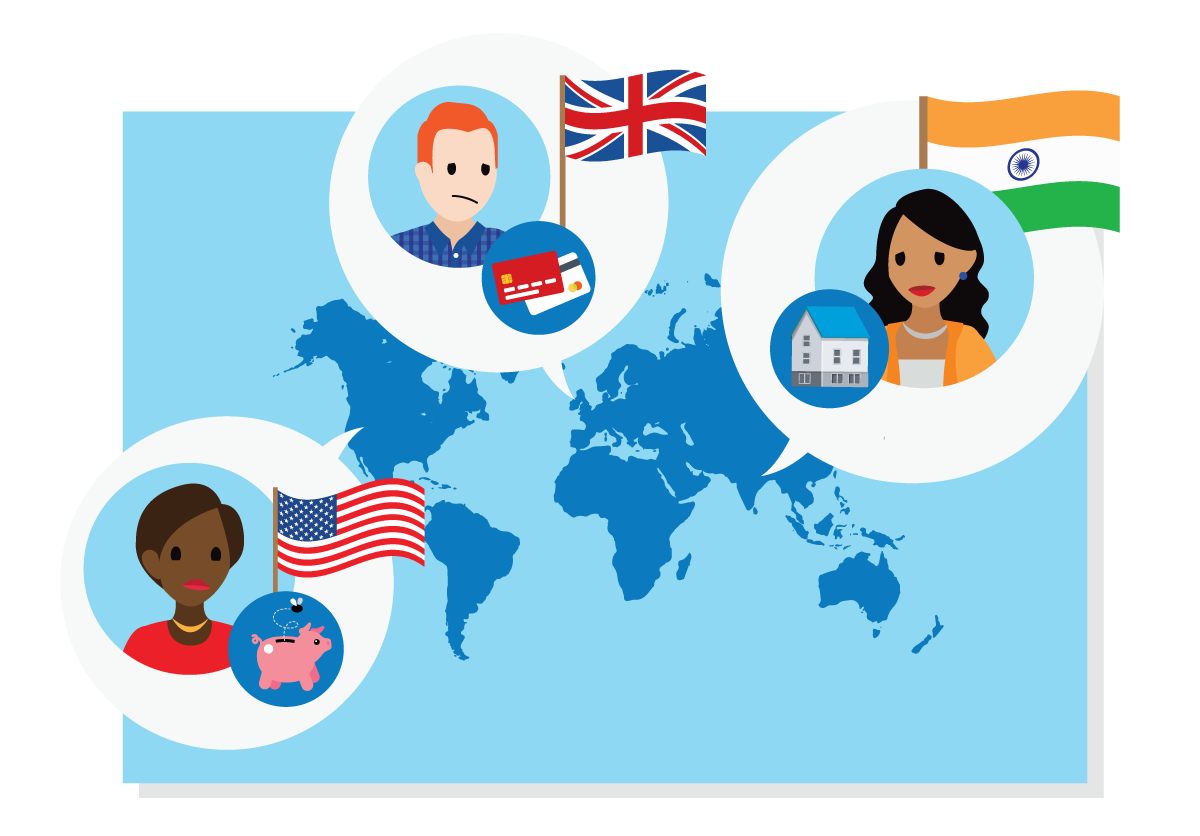Gain a Money Mindset
Learning Objectives
After completing this unit, you’ll be able to:
- Learn how money impacts your health and wellbeing.
- Explain how worrying about money influences financial behaviors.
- Define financial wellbeing.
Before we dive in, take a moment to assess your relationship with money.
Money Exercise: Do any of these cues from the American Psychological Association sound familiar?
- You try to put money matters out of your mind.
- You avoid talking about your finances with family members and loved ones.
- You avoid opening bank statements or credit card bills.
- You don’t know your credit score.
If you can relate to any of these, you may need to shift your money mindset. That’s what this module is all about—we give you the information and resources to help you prosper.
Money and Your Wellbeing

No one really wants to talk about money. In fact, according to a Wells Fargo survey, people are more uncomfortable talking about money than death, politics, or religion. Why is talking about money so taboo?
It turns out money can be a major life stressor. And this is true for people all around the world.

Financial concerns vary from country to country and person to person. Whether you’re dealing with debt, worried about retirement, managing your investments, or saving for your next big purchase, one thing is true: Money is constantly top of mind.
- More than half of Americans reported money was a significant source of stress. ( Stress in America™ Survey, 2017)
- Personal finances are a leading cause of stress among Australians. ( Stress and wellbeing in Australia)
- Two out of three top concerns among employees are money-related. ( DNA of Financial Wellbeing report)
- More than half of millennials in India are worried that they will run out of money before they retire. ( Cigna TTK Health Insurance Co)
Worry Leads to Stress, Which Leads to Avoidance, Which Leads to...
So what happens when you’re stressed about your financial situation? Well, you get a lot of what we discussed in the money exercise above—avoidance. But that’s a bad thing when it comes to bills, rent, mortgage, and so on. Putting these off can quickly make a difficult financial situation worse.
There is a way out, a path to reducing stress about money and confidently pursuing your financial goals. And it doesn’t include having vast amounts of money.
The Money Paradox

Money Myth: The more money you have, the happier you are.
While money and wealth can help you live the life you want to live, reports like the Employer’s Guide to Financial Wellbeing from Salary Finance show that financial stress occurs across all income levels. Among those surveyed, people who earn UK£10,000-£15,000 experience the same level of high financial worry as those who earn more than £100,000 per year.
According to a 2018 PwC Financial Wellness survey, employees at the highest income level (US$100k+) also experience cash and debt challenges, with nearly half of employees carrying credit card balances and one third of them finding it difficult to make the minimum payment each month.
Bottom Line: You own your path to financial freedom no matter where you are and what your income is. That’s why it’s important to focus on your financial wellbeing rather than avoiding money issues.
Focusing on your financial wellbeing can help remove worry from the equation. It helps you create your own path to financial security and financial freedom of choice. It helps you reduce stress and improve your mental wellbeing ( APA).
Define Your Financial Wellbeing
So what is financial wellbeing? It’s the freedom to make financial decisions without constant fear or worry, while confidently pursuing your financial goals. This takes work. It takes time to put a plan in place.
But remember, it’s about progress, not perfection.

The Consumer Financial Protection Bureau (CFPB) says there are four elements of financial wellbeing.
- Control over day-to-day and long-term decisions about money
- Capacity to manage unexpected financial circumstances
- Ability to meet your financial goals
- Autonomy to make choices that allow you to enjoy life
So how do you get started on your journey to financial wellbeing?
According to Smart About Money the first step is to get clear about what financial security looks like for you. Smart About Money defines financial security as the feeling of having enough money to cover your needs.
Financial Security and Goals
Money Exercise: Take a moment to think about how you would answer the following sentence.
I will know I am financially secure when _______________________.
Next, identify your life goals.
- What do you want to achieve in the short-term?
- What about the long-term?
Maybe you want to start your own business, take a dream trip, or buy a house. Or maybe you want to take a sabbatical before retirement.
No matter your goals, with a little education, planning, and a can-do mindset, you have the power to create your path to financial wellbeing—whatever that means for you.
Money Exercise: Set SMART goals to provide clarity and focus for your major life goals, and jot them down in a notebook or open a Quip doc for easy reference. According to psychology professor Dr. Gail Matthews, people who write down their goals and track their progress are 42% more likely to achieve them (Inc.).
Let’s Sum It Up
Money can be a major source of stress, but it shouldn’t control our behavior and it’s not the end of the story. Changing how you think about money and focusing on your financial wellbeing can help improve your relationship with money. Next up, improve your financial literacy to make informed decisions and create a path to achieving your goals.
Resources
- Article: Face the numbers (APA)
- Article: Conversations About Personal Finance (Wells Fargo)
- Press Release: APA Stress in America™ Survey (APA)
- Press Release: One-third of Australia stressed out (APS)
- Article: Neyber Publishes Report on the DNA of Financial Wellbeing (MALG)
- Article: Millennials in India Lead as the Most Stressed in the World (Workforce)
- Guide: The Employer’s Guide to Financial Wellbeing (Salary Finance, form fill required)
- Abstract: Financial well-being: What it means and how to help (CFPB)
- Article: What Is Financial well-being? (Smart About Money)
- Article: SMART Goals: How to Make Your Goals Achievable (MindTools)
- Article: This Is the Way You Need to Write Down Your Goals for Faster Success (Inc.)
